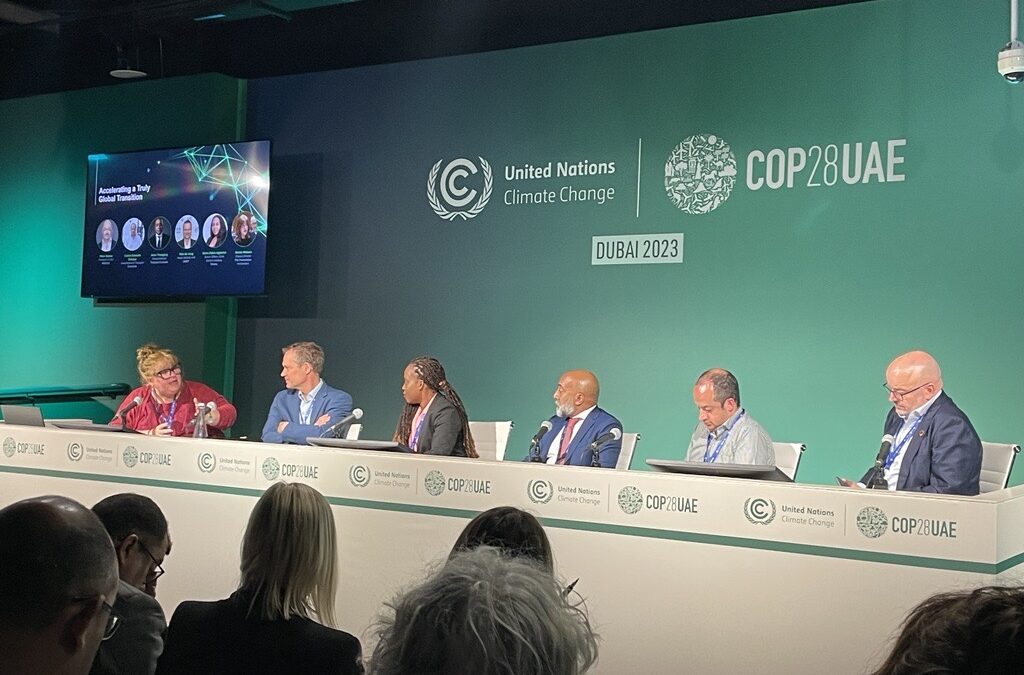The 28th United Nations Climate Change Conference (COP28) took place in Dubai earlier this month, marking an important milestone in the global effort against climate change and indicating a transition away from the fossil fuel era. The operationalization of the Loss and Damage Fund and the inclusion of language addressing fossil fuels in an official agreement for the first time has set the stage for a more sustainable future, with a notable emphasis on zero-emission vehicles (ZEVs).
Transition Away from Fossil Fuels
COP28 saw the inclusion of language in a UNFCCC document endorsing the “beginning of the end” for fossil fuels. The adopted statement, “Transitioning away from fossil fuels in energy systems in a just, orderly and equitable manner, accelerating action in this critical decade to achieve net zero by 2050 in keeping with science,” represents a crucial step toward achieving net-zero emissions by 2050.
ZEVs at the Core of Climate Negotiations
In an unprecedented move, COP28 integrated language in the first global stocktake addressing road transport , underscoring the crucial role of ZEVs. The statement, “Accelerating the reduction of emissions from road transport through infrastructure development and rapid deployment of zero- and low-emission vehicles,” marked a paradigm shift, positioning ZEVs at the core of global decarbonization discussions.
Global Commitment to ZEVs
Transportation accounts for 21% of global CO2 emissions, with road vehicles responsible for three-quarters of emissions from the sector. Addressing greenhouse gas (GHG) emissions from road transport is particularly critical. In 2022, cars, trucks, and other road vehicles were accountable for approximately three-quarters of the total CO2 emissions from transportation.
The ZEV Declaration and the Accelerating to Zero (A2Z) Coalition featured prominently at COP28 during a high-level event on accelerating the ZEV revolution, co-hosted by the International Council on Clean Transportation, FIA Foundation, and Government of the United Kingdom. The event featured high-level speakers from Canada, Colombia, Ghana, Iceland, Lithuania, the UK, and the United States.
A2Z also spearheaded the development and release of a new report updating global progress towards a Paris-aligned ZEV transition. In collaboration with CALSTART/Drive to Zero, Clean Energy Ministerial Climate Group, First Movers Coalition, and Smart Freight Center, the report overviews progress to date and highlights seven global initiatives collectively working to accelerate the ZEV transition.
COP28 showcased several other impactful announcements and initiatives, underscoring the world’s commitment to a sustainable road transport future:
- Road Transport Breakthrough Priority Actions for 2024: Launched at the World Climate Action Summit, this roadmap focuses on standards, finance, and market creation to halve emissions by 2030.
- ZEV Transition Council (ZEVTC) Global Roadmap: A comprehensive plan to strengthen international assistance for the ZEV transition in Emerging Markets and Developing Economies.
- Zero Emission Vehicles Emerging Markets Initiative (ZEV-EM-I): Partner companies and governments collaborate to bridge the gap between leading and emerging markets, featuring deliverables like a national data-sharing platform and e-freight pilot deployment.
- Global Fuel Economy Initiative Report: Emphasizing the need to curb SUV growth, the report calls for vehicle size caps, accelerating the shift to EVs, and deploying energy-saving technologies.
- Five New Signatories to the Global MoU on Zero-Emission Medium- and Heavy-duty Vehicles: Cape Verde, Colombia, Ghana, Iceland, Israel, Papua New Guinea commit to achieving 100% new zero-emission truck and bus sales by 2040, with an interim goal of 30% by 2030.
- Collective for Clean Transport Finance 2024 Agenda: Formally launched, this collective aligns governments, businesses, and private finance to accelerate the transition to clean transport, emphasizing EV buses and zero-emission medium and heavy-duty freight.
- CALSTART’s Report on Global Progress Towards Decarbonizing Transportation: Tracking leading countries’ progress and recommending strategies for accelerating the global zero-emission transport sector.
- International Transport Forum’s Report ‘New but used: the electric vehicle transition and global second-hand car trade’: Providing insight into the future of the electric vehicle transition and the global second-hand car trade, emphasizing traceability and roadworthiness criteria.
- Expansion of the ZEV-Rapid Response Facility (ZEV-RRF): Additional funding and expanded support for countries committed to zero-emission medium- and heavy-duty vehicles.
As COP28 concludes, the roadmap for COP29 is clear. The qualitative targets set at COP28 lay the foundation for quantitative breakthroughs, ensuring that the journey toward a zero-emission road future remains at the forefront of global climate action. The collective momentum generated at COP28 paves the way for a sustainable and resilient tomorrow, where zero-emission vehicles drive change on the path to a greener world.

